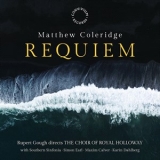Dies ist bereits die zweite Einspielung des Requiems von Matthew Coleridge (*1980). Er ist ein autodidaktischer Chorkomponist und Dirigent, und sein erstes großes Chorwerk, eben dieses Requiem, wurde 2016 komponiert. Es gibt darin keine Schreckensbilder von göttlichem Zorn, sondern viel Wärme und wunderschöne Melodien, gesungen vom Chor, den Solisten und vor allem auch vom Solocello. Coleridges musikalische Sprache und sein Stil sind nicht dem zuzurechnen, was viele heute unter zeitgenössischer Musik verstehen. Aber, muss das sein? Ist es nicht viel wichtiger, wie aussagekräftig und bewegend die Musik ist?
Neben dem etwa halbstündigen Requiem erklingen weitere Kompositionen von Coleridge, die diesen als nicht weniger empfindsamen Komponisten zeigen und sich mit ihrer eingängigen Melodik dem Hörer einprägen.
Der gut ausbalancierte Chor, die Solisten, die Musiker, sie alle stellen sich unter Robert Goughs stimmungsvoll sensiblem Dirigat hingebungsvoll in den Dienst dieser schönen Musik.
This is already the second recording of the Requiem by Matthew Coleridge (*1980). He is a self-taught choral composer and conductor, and his first major choral work, this very Requiem, was composed in 2016. There are no horror images of divine wrath in it, but much warmth and beautiful melodies sung by the choir, soloists, and especially the solo cello. Coleridge’s musical language and style are not what many today understand by contemporary music. But, does it have to be? Isn’t it much more important how meaningful and moving the music is?
In addition to the Requiem, which lasts about half an hour, there are other compositions by Coleridge which show him to be no less sensitive a composer, and which impress themselves on the listener with their catchy melodies.
The well-balanced choir, the soloists, the musicians, they all devote themselves to the service of this beautiful music under Robert Gough’s atmospherically sensitive conducting.
























